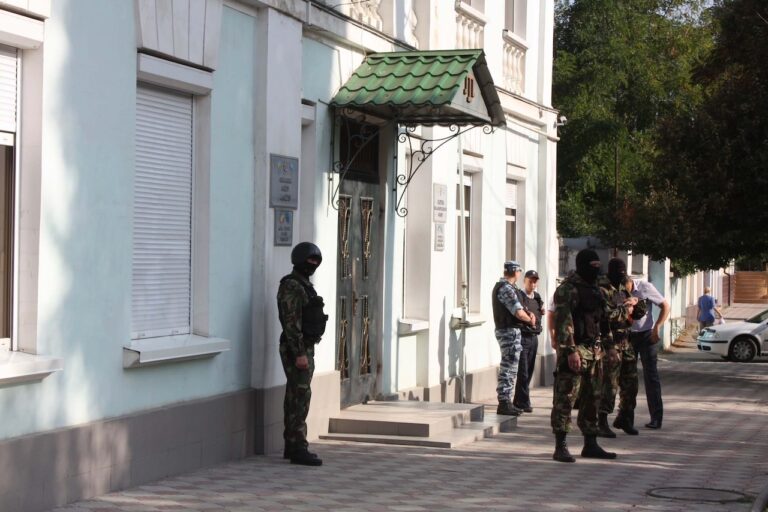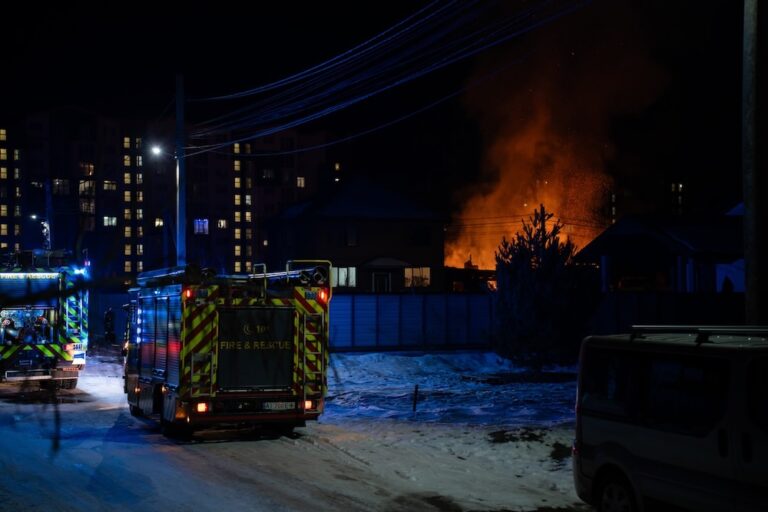(RSF/IFEX) – The folowing is an 11 May 2000 RSF press release: Serbia, Ukraine, Azerbaijan, Kirgizia About 50 opposition media fined heavily since the start of the year In Serbia, as well as in Ukraine, Azerbaijan and Kirgizia, offences such as “libel”, “insult” and “publishing false information” are punishable by severe fines. Media that are […]
(RSF/IFEX) – The folowing is an 11 May 2000 RSF press release:
Serbia, Ukraine, Azerbaijan, Kirgizia
About 50 opposition media fined heavily since the start of the year
In Serbia, as well as in Ukraine, Azerbaijan and Kirgizia, offences such as “libel”, “insult” and “publishing false information” are punishable by severe fines. Media that are sentenced to pay such fines at hasty trials may even face closure. Since 1 January 2000, more than 30 independent and opposition media have been fined in Serbia. The total fines paid since the information law was introduced in October 1998 is 28 million dinar (2.7 million euros). In Ukraine 2,257 complaints against media and journalists were filed in 1999 and the total amount demanded in damages was 90 billion hryvna (14.7 billion euros) – three times the country’s annual budget. In Azerbaijan, about 15 of the most influential media were convicted of “libel” in 1999 and ordered to pay total fines of around a million euros. The new decree on the media, in force since 8 February 2000, reintroduced censorship. In Kirgizia, after the legislative elections in February, financial pressure was stepped up against media which questioned the legality of the poll.
In Serbia the October 1998 information law, which provides for heavy fines for “offensive comments” or “false statements” if anyone files a complaint, is still being widely used to snuff out any flicker of independence. Following complaints by people close to the government, about 30 court cases have been brought since 1 January 2000 against media regarded as hostile. Between 3 and 5 May 2000, Belgrade’s municipal television, Studio B, which is controlled by the opposition, was convicted of three offences and fined a total of 1,180,000 dinar (107,270 euros) following its coverage of clashes between activists of the student organisation Otpor and members of the Party of the Yugoslav Left (JUL), which is led by Slobodan Milosevic’s wife, in the south-eastern city of Pozarevac on 2 May. The convictions brought the number of fines inflicted on the channel to a total of six since the start of this year. Since 20 December 1999 the opposition weekly Kikinske Novine has been sentenced on three occasions and fined a total of 1,080,000 dinar (98,182 euros) due to seven complaints, all filed by the editor of the government daily Komuna. During the same period, independent dailies Danas, Blic and Narodne Novine, independent opposition weeklies Vreme, Nin, Srpka Rec and Nezavisna Svetlost and independent news agency Beta were all sentenced to fines ranging from 150,000 to 450,000 dinar (13,500 to 40,500 euros). On 20 April 2000, federal telecommunications minister Ivan Markovic said: “Even God would be unable to save a single transmitter belonging to news media that have not paid their fines and are broadcasting without an official licence.” The minister added that he had at his disposal “enough inspectors to close down three times more media than those in Serbia and Montenegro put together”.
In Ukraine, libel cases are frequently brought against opposition media. Although not all the 2,257 complaints filed in 1999 resulted in convictions, the total fines imposed last year came to 1.5 million hryvna (300,000 euros). On 3 May 2000, about 60 Ukrainian journalists set up a barricade on Kiev’s central square to protest pressure from the tax and legal authorities. The protest followed the sentencing of independent regional daily Lviv Express, in western Ukraine, to pay 150,000 hryvna (30,000 euros) in damages after a musician filed a complaint against the newspaper. In a report published in 1997 Lviv Express had accused the musician of plagiarism. To give another example: in March 360,000 hryvna (72,000 euros) in damages was demanded from the weekly Pryvatna Sprava, published in the central town of Poltava, by a businessman the newspaper had accused of involvement in fraud.
In Azerbaijan, about 15 media were fined heavily for “libel” in 1999. The total demanded came to 7 billion manat (1.2 million euros). The number of libel trials has been increasing since the new decree on the media came into force in February 2000. The weekly Monitor, which resumed publication on 20 February, was again threatened with closure after its managers refused to pay a fine of 100 million manat (20,000 euros). The newspaper had already been put into receivership in July 1998 after being fined 16 billion manat (2.7 million euros) for “insulting the Azerbaijani nation”. Three university professors had filed the complaint. On 10 March the editor of the newspaper Alem was fined 5.5 million manat (1,000 euros) following a complaint filed by the ecclesiastical department of Caucasus Moslems, on the pretext that it had published pornographic material.
In Kirgizia, the instances of electoral fraud observed by the Organisation for Security and Cooperation in Europe (OSCE) during the February legislative elections were accompanied by increasing pressure on the media. On 4 April a Bishkek court ruled that the independent weekly Res Publika would be suspended until it had paid a fine of 40,000 som (850 euros). The newspaper was convicted on 31 March of libelling a local politician. Res Publika is also alleged not to have paid a fine of 200,000 som (4,000 euros) imposed on 16 January for “damaging the honour and dignity” of the chairman of the government television channel TV Kyrgyz. Shortly beforehand, the opposition newspaper Asab had been fined 2 million som (40,000 euros) for “tax fraud”. On 4 May, commenting on the closure of some publications in Kirgizia, an OSCE representative said he did not think the newspapers had disappeared “solely for financial reasons”.
Faced with this situation, Reporters Sans Frontières calls on the authorities of these four countries to respect the commitments they made concerning press freedom by ratifying the International Covenant on Civil and Political Rights, Article 19 of which guarantees freedom of speech.
Reporters Sans Frontières also calls on the United Nations’ Special Rapporteur on Human Rights in the former Yugoslavia, Jiri Diensbier, to do everything in his power to persuade the Serbian authorities to repeal the information law in force since October 1998.
Finally, Reporters Sans Frontières urges the Council of Europe, to which Ukraine has belonged since 1995, to ensure that the country respects the commitments that go along with membership, particularly those concerning press freedom.


